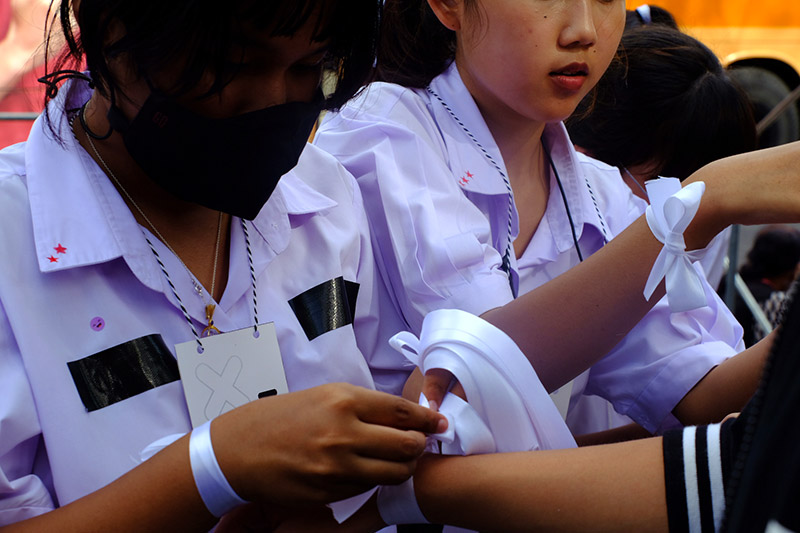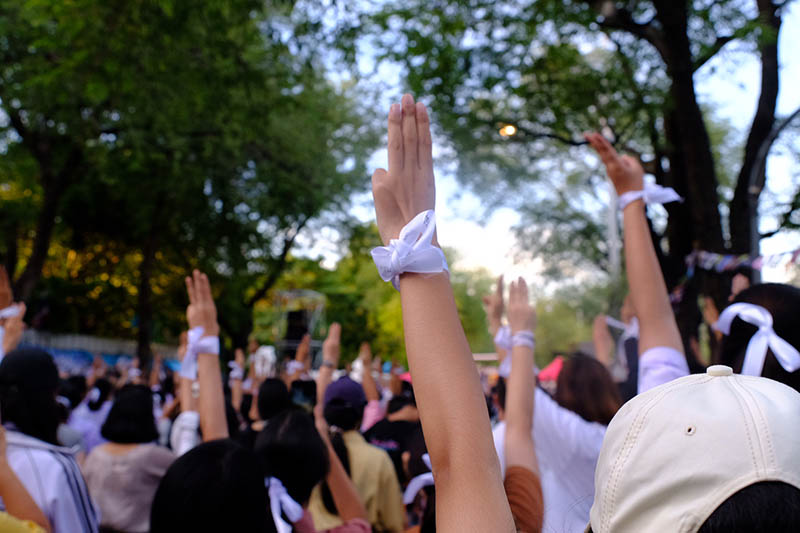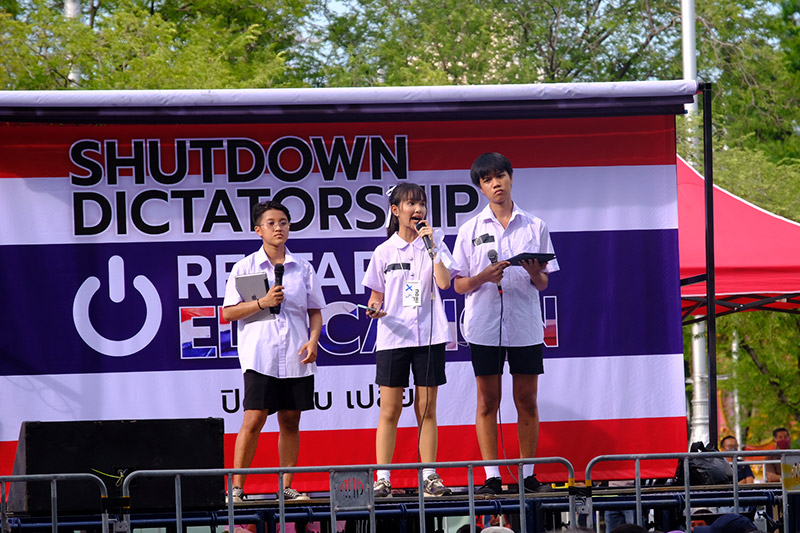For decades, the reality of Thai school has been total submission to strict dress codes, long hours, an obsession with test scores and abuse at the hands of educators.
Teachers, a revered class in society, often wield arbitrary power to punish students deemed to have broken the rules. They are hit; their hair forcibly shorn; their knees bruised from repetitive kneeling.
After generations of forced obeisance, the students have had enough.
“Do you know why dinosaurs went extinct?” a young protester asked at a recent rally in front of the Education Ministry, using a popular reference for the military power elite. “It was because of asteroids. We here are asteroids, and your end is nigh.”

The student was one of hundreds who gathered with black tape over the names embroidered on their uniforms to call for the education minister discuss their concerns. While university students may be once again leading the way on organizing mass rallies, secondary students have emerged as a potent force in their own right as they revolt against outdated expectations of what makes a good student.
Also at the rally was 18-year-old Popcorn, who had traveled from Ayutthaya and said he’s seen those expectations translate into violence.
“They always teach us that the school belongs to King Rama VIII … Every Monday, all students must kowtow to [his statue.] One student chose not to do that and sat still in line, so a teacher walked to him, pushed his back and slapped his head,” said Popcorn, who asked not to be named for fear of retribution.
Popcorn said making such displays of fealty should be a personal choice.
“We have the right to do it or not do it,” he said.
Natcha, a 15-year-old schoolgirl from Bangkok, described in a quavering voice one disturbing experience that happened to a friend.
“A teacher walked from behind to my friend’s back, pinched her bra strap and snapped it to hurt her, because she wasn’t wearing an undershirt to compensate for the thinness of the school uniform. It’s against the rules to not wear an undershirt,” said Natcha, who was also at the protest and also asked that her full name not be published. “My friend didn’t do anything afterward because she was too afraid.”
Morning ceremonies, a common school ritual in which students line up to recite the national and royal anthems, Buddhist prayers and vows to be “good kids,” can be fraught for those who deemed to have strayed from conformity.
Those morning assemblies have become front lines for the anger that is propelling Thailand’s youth to break taboo and show rare defiance during the past two months as protests against the government spread. As rebellion spilled from college campuses to schools nationwide, the three-finger salutes associated with the movement have been springing up at the ceremonies.
That’s prompted some schools to cancel the routine entirely.
Manop, a 16-year-old student from Suankularb Wittayalai Nonthaburi School in northwest metro Bangkok, said he and his friends got in trouble for organizing political activities there – at first.
“They seized our white ribbons. They took our [three-finger salutes] hands down. They called us into the discipline office and chastised us for ‘ruining the school’s reputation,’” said Manop, who also asked that his name be withheld for fear of further intimidation.
“Our advisor received an intimidating call asking if he had money to bail his students out,” Manop added.

But he said the sheer scope of the student uprising “seems to have forced them to accept our activities.”
Popcorn agreed, saying his school has canceled general morning assemblies.
“There are no more assemblies in the school yard. Each grade does their own routine at separate places inside the buildings now. … They said ‘the sun is too hot,’” he said.
Since 2011, 382 cases of school harassment have been reported to the Education Ministry, by its official count. But Thai Lawyers for Human Rights logged 103 cases reported in three days after high school protests erupted Aug. 17.
Prempapat Plittapolkranpim from Newground, an independent group focused on youth issues, said the official ministry number is far from reality.
“These official numbers do not represent reality. Thai kids always know how they will be punished if they break the rules but have no idea how to help themselves if they face harassment,” Prempapat said.
A survey of 6,000 students by the group found that most did not believe they would receive justice, let alone an apology, if wronged by someone in a position of authority.
“Especially if those authorities are teachers, monks, doctors or parents,” Prepapat added.
That’s reflected in the number of offenders who are protected by the system. Three-fifths of the ministry’s 382 recorded offenses – 233 cases – involved sexual misconduct involving teachers, over half of whom are still teaching.
“Thailand has never had a democratic culture. But since people have started talking about it on social media and in their social groups, those voices are getting louder. Things have changed,” Prempapat said.
Related
Thai army denies stockpiling tear gas, rubber bullets for Saturday’s protest
Raising anti-government salutes, high school students show protest support




